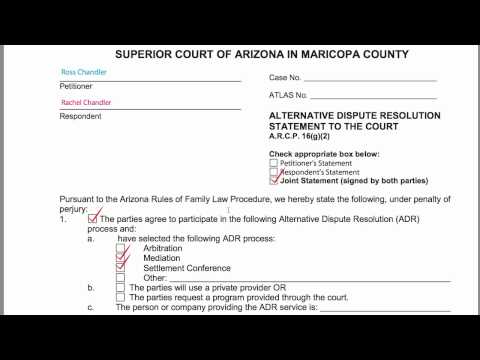
Introduction:
Welcome to this informative article on “Navigating Divorce in Arizona: Exploring Alternatives to Court Proceedings”. In this piece, we will delve into various alternatives that individuals going through a divorce in Arizona can consider, instead of resorting to traditional court proceedings. It is essential to note that while this article aims to provide valuable insights, it is crucial to cross-reference with other sources or consult with legal professionals for specific advice tailored to your situation. Let’s begin by exploring the alternatives available to you in navigating divorce in Arizona.
Can You Obtain a Divorce in Arizona Without Court Proceedings?
Navigating Divorce in Arizona: Exploring Alternatives to Court Proceedings
📋 Content in this article
Divorce can be a complex and emotionally challenging process. Many individuals going through a divorce may assume that the only way to legally dissolve their marriage is through traditional court proceedings. However, in the state of Arizona, there are alternative methods available that allow couples to obtain a divorce without going through the full extent of court litigation. In this article, we will explore these alternatives and explain how you can navigate the divorce process in Arizona.
1. Mediation:
One popular alternative to court proceedings in Arizona is mediation. Mediation is a voluntary process where a neutral third party, known as a mediator, assists both spouses in reaching an agreement on the terms of their divorce. The mediator does not make decisions for the couple but rather facilitates communication and helps them explore possible solutions.
During mediation, both parties have the opportunity to discuss their concerns and interests openly. The mediator’s role is to ensure that these conversations remain productive and focused on finding mutually acceptable solutions. This alternative allows couples to have more control over their divorce outcome and can often result in a more amicable and efficient process.
2. Collaborative Divorce:
Collaborative divorce is another option available in Arizona that avoids court proceedings. In this approach, each spouse retains their own attorney, and all parties commit to working together to reach a settlement agreement outside of court. Collaborative divorce emphasizes open communication, cooperation, and problem-solving.
During collaborative divorce, the spouses and their attorneys engage in a series of meetings to negotiate and resolve various issues such as child custody, property division, and spousal support. If an agreement cannot be reached, the collaborative attorneys withdraw, and the case proceeds to court. This incentivizes all parties involved to actively participate in finding mutually beneficial solutions.
3. Summary Divorce:
In certain cases where there are no significant disputes or complicated issues to address, Arizona law allows for
Understanding Discovery in Arizona Divorce Proceedings
Understanding Discovery in Arizona Divorce Proceedings
In Arizona, as in other states, the divorce process can involve various legal procedures and requirements. One important aspect of divorce proceedings is the process of discovery. Discovery refers to the exchange of information between the parties involved in a divorce case. It is a crucial step in gathering evidence and preparing for trial or settlement negotiations. This article aims to provide a comprehensive understanding of discovery in Arizona divorce proceedings.
1. Purpose of Discovery
The primary purpose of discovery is to ensure that both parties have access to relevant information about the marriage and its dissolution. It allows each party to obtain evidence, documents, and facts necessary to support their claims or defenses. By exchanging information through discovery, the parties can avoid surprises at trial and reach a fair resolution.
2. Types of Discovery Methods
In Arizona divorce proceedings, several methods of discovery are available. These methods include:
Title: Navigating Divorce in Arizona: Exploring Alternatives to Court Proceedings
Introduction:
Divorce is a challenging and emotionally charged process that many individuals may face in their lives. In the state of Arizona, as in most jurisdictions, traditionally, divorce cases are resolved through court proceedings. However, it is crucial for individuals going through a divorce to stay current on the topic and be aware of the alternatives that exist. This article aims to shed light on the various alternatives to court proceedings in Arizona, providing a comprehensive overview to help individuals make informed decisions during this difficult time.
Importance of Staying Current:
The legal landscape surrounding divorce proceedings in Arizona, like any area of law, can undergo changes and updates. As laws evolve, new alternatives to traditional court proceedings may emerge, offering more efficient and collaborative approaches to divorce. By staying current on this topic, individuals can explore options that may be better suited to their unique circumstances.
Verification and Cross-Referencing:
It is essential to note that laws and regulations are subject to change and can vary across jurisdictions. Therefore, readers must verify and cross-reference the information presented here with official sources such as statutes, regulations, and legal professionals practicing in Arizona. This article serves as a starting point for research and should not be considered legal advice.
Exploring Alternatives to Court Proceedings in Arizona:
1. Mediation:
Mediation is a voluntary process in which divorcing spouses work with a neutral third-party mediator to negotiate and reach agreements on various aspects of their divorce. This alternative allows couples to maintain control over the decision-making process while minimizing conflict. It is crucial to ensure that the mediator chosen is qualified and experienced in family law matters.
2. Collaborative Divorce:
Collaborative divorce is a cooperative process where each spouse hires an attorney trained in collaborative law. The couple and their attorneys then work together in a series of meetings to negotiate mutually beneficial agreements. Collaborative divorce encourages open communication and problem-solving, allowing for a more amicable resolution.
